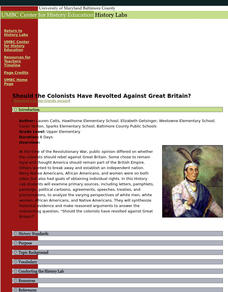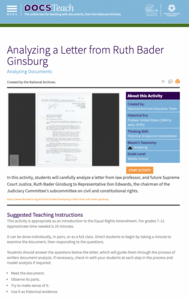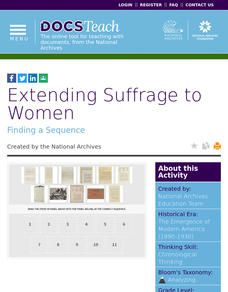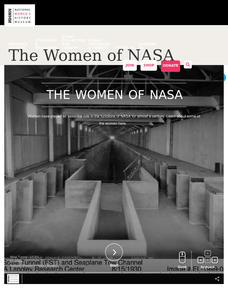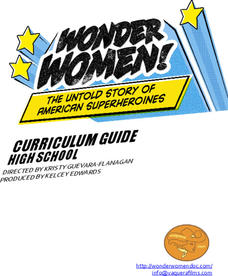Center for History Education
Should the Colonists Have Revolted Against Great Britain?
Should the Americans have taken the plunge and revolted against Great Britain? Using documents, including the famed Common Sense and a Loyalist response, pupils conduct a lengthy investigation of the question. The interesting resource...
Center for History Education
Women's Rights in the American Century
Today, many young people find it hard to understand why it took over 150 years for women in the United States to get the right to vote—why there was even a need for the suffrage movement. As they read a series of primary source...
DocsTeach
Analyzing a Letter from Ruth Bader Ginsburg
Before her career as a Supreme Court Justice, the Notorious RBG was a legal activist for women's rights. Using a letter from then-Professor Ginsburg, young historians carefully examine a letter from Ginsburg to a member of Congress...
DocsTeach
Suffrage Photograph Analysis
Votes for women! Young scholars use images to explore the suffrage movement and its impact on the United States. Historians work in groups or pairs to interpret the photograph, complete a worksheet, and discuss how their opinions of the...
Center for History Education
Speaking Up and Speaking Out: Exploring the Lives of Black Women During the 19th Century
Young historians investigate the often-hidden history of free and enslaved African American women before the Civil War. Using a collection of primary and secondary sources, including speeches, diaries, and poems, they evaluate the often...
Center for History Education
Nineteenth Century Reform Movements: Women's Rights
It's hard to imagine a world where women were marginalized from the seats of power. Yet, there are women today who remember what it was like to not be allowed to vote. Using a DBQ of images and other primary sources, such as political...
Center for History Education
Methods of Reform: The Lowell Mill Girls
Although the girls and women who worked in the Lowell Mills are not often seen this way, they are the forbearers of the American labor movement. Pupils examine primary sources, including testimony about life at Lowell and labor laws, as...
Center for History Education
How Did the Public View Women’s Contributions to the Revolutionary War Effort?
Calling upon the legacies of Joan of Arc, Elizabeth I, and Catherine the Great, Esther Reed rallied Southern women to support the American Revolution. Using a broadside by Reed and other primary sources, such as poetry, young historians...
Center for History Education
The Non-Importation Movement
Boycott for free trade! An eye-opening lesson plan explores the non-importation movement created by American colonists in response to the Stamp and Sugar Acts. Scholars specifically look at the impact the boycott had on colonial women...
Center for History Education
Native American Gender Roles in Maryland
Toss gender roles out the window—some societies lived in a world where women not only possessed the family wealth but also were the farmers and butchers. Many Native American societies had more gender equity than European societies....
National Woman's History Museum
Women's Suffrage Movement
The National Women's History Museum offers a 20-slide presentation that details the history of the Women's Suffrage Movement from its creation in the 1830s through the passage of the Nineteenth Amendment in 1920.
DocsTeach
Extending Suffrage to Women
Votes for women! The activity highlights the push for the Nineteenth Amendment giving women the right to vote. High school scholars learn how the Fifteenth Amendment giving African American men the right to vote helped to spark the...
National Woman's History Museum
The Women of NASA
Human computers? Although it may sound like science fiction, the term was used to describe the women who made the NASA calculations before the advent of electronic computers. A 21-slide presentation introduces viewers to the women who...
Vaquera Films
Wonder Women - The Untold Story of American Superheroines: High School Curriculum Guide
A 41-page curriculum guide tells the story of the untold stories of American Superheroines! Divided into three modules, the guide is designed to be used before, during, and after viewing the 2012 documentary Wonder Women! The Untold...
C-SPAN
Landmark Supreme Court Case: Roe v Wade
Perhaps no issue is as controversial than abortion in the American landscape. Go beyond the rhetoric by examining the Supreme Court case that legalized abortion in the United States. A guided note-taking activity unpacks the arguments...
National Woman's History Museum
Breaking Through Gender Roles: The Women of NASA
Whether recognized or not, extraordinary women were integral to breaking gender barriers and putting Americans into space. For Women's History Month, explore a series of video clips and biographical information that profile these...
National Woman's History Museum
Breaking Barriers: Women’s Basketball Documents
Is basketball ladylike? A pressing debate in the nineteenth century explored the issue in the sports world. Using images, news reports, and the rules of the game, young scholars decide whether the sport helped advance the cause of women...
National Woman's History Museum
The Supreme Court and the Lives of American Women 1908-2005
While Roe v. Wade and the passage of the Nineteenth Amendment often get top billing in women's history, other lesser-known laws impact their daily lives. Pupils research cases such as Planned Parenthood v. Casey and use a jigsaw model to...
C-SPAN
Women's Suffrage and the 19th Amendment
The right to vote was hard-won after decades of organizing by women and their allies. Using a series of video clips featuring women's historians, class members consider the efforts behind the Nineteenth Amendment. Possible extension...
C-SPAN
Choice Board - Conversations with Suffragists
Celebrate 100 years of women's suffrage by planning a re-enactment of famous women discussing their fight. After learners view a series of interviews with famous women played by actors, including Susan B. Anthony, Sojourner Truth, and...
Digital Public Library of America
Fannie Lou Hamer and the Civil Rights Movement in Rural Mississippi
Good primary resources, offering different perspectives on important issues and events, are hard to find. A packet of 12 primary source images, videos, audio recordings, records, and newspaper articles related to the 1960s civil rights...
DocsTeach
Around the World with First Lady Pat Nixon
Travel the world with the First Lady! Academics study images from Pat Nixon's travels as First Lady to discover her role in Richard Nixon's presidency. Historians match images to world locations, complete a worksheet, and participate in...
DocsTeach
Analyzing a Photograph of Sally Ride
Sometimes, a picture really does say it all. The activity uses a picture of astronaut Sally Ride to help elementary academics make observations and form conclusions. Young historians study the picture, complete short written prompts, and...
National Woman's History Museum
Eleanor Roosevelt: An Agent of Social Change
First ladies often take a back seat to their husbands' policies, but Eleanor Roosevelt broke that mold. Interested historians examine primary sources written by Roosevelt, including a speech and articles. Completing a round-robin of...


